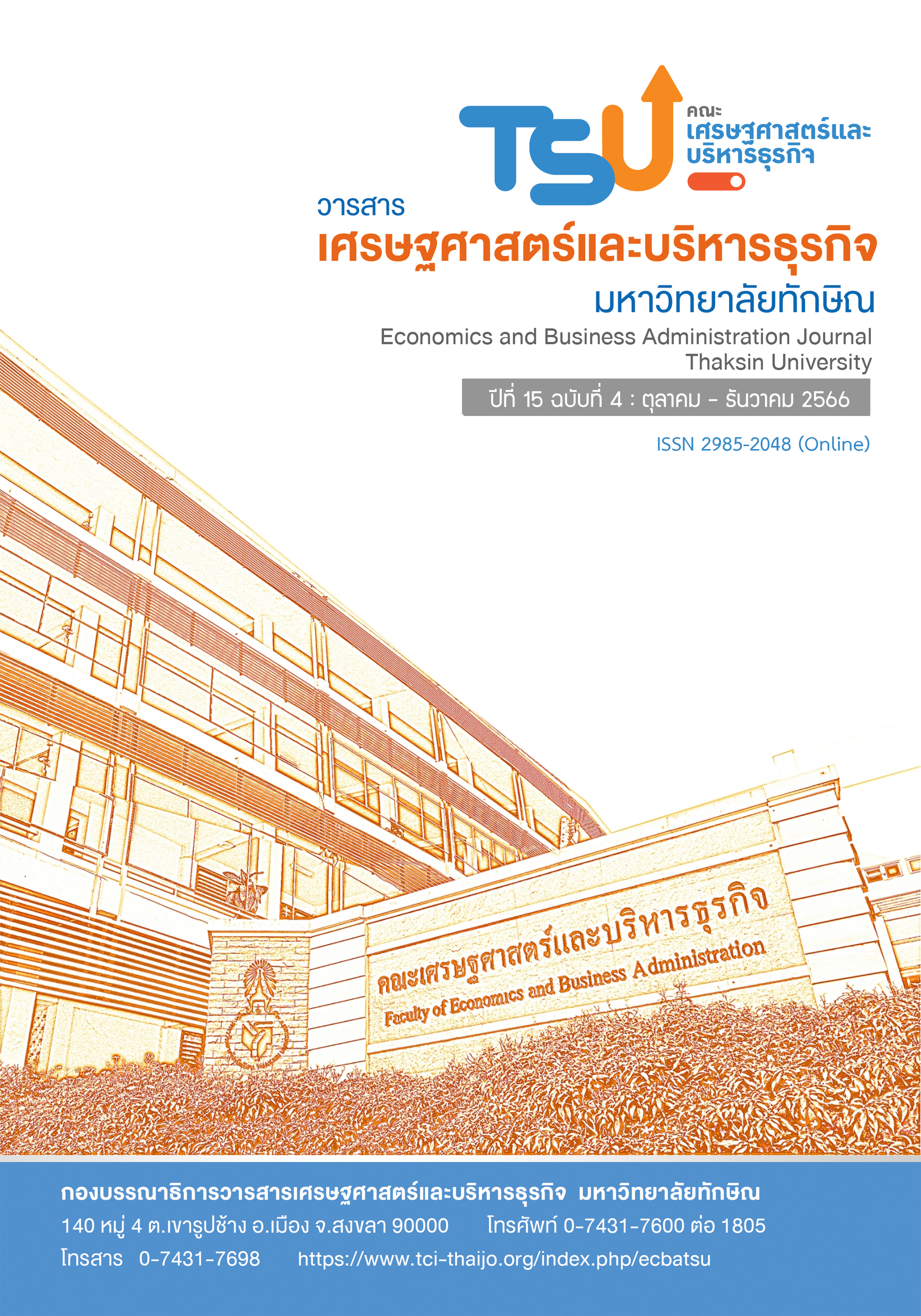The Relationship between the 21st Century Skills with Determination in Performance of Operational Employees in Beverage Business during the COVID-19 Crisis
DOI:
https://doi.org/10.55164/ecbajournal.v15i4.261644Keywords:
The 21st Century Skills, Determination, Performance, Beverage BusinessAbstract
The purposes of this research were to 1) study the opinion about 21st century skills and determination in performance of employees; 2) compare the personal data with the 21st century skills; 3) compare the personal data with determination in performance of employees; and 4) study the relationship between the 21st century skills and determination in performance of employees. The population used in this research were 266 support staff in beverage company, T.C. Pharmaceutical Industries, Head office. The tool to collect data was questionnaire. The statistics for data analysis included frequency, percentage, population mean, variance, F-test and correlation coefficient.
The result of the research shown that 1) the overall opinion of skills in the 21st century was at high level ( = 3.86) and the overall opinion of determination in performance of employee also was at high level (
= 4.21); 2) The comparison with the personal data classified by different age, working experience, salary, and division have different skills in the 21st century; 3) The comparison with the personal data classified by different age, working experience, salary, and division have not difference with determination in performance of employees; 4) The analysis of relationship between skills in the 21st century and determination in performance of employee was relatively at quite high level (R = 0.63) with statistically significant at 0.01
References
Atthakamo, P. (2012). A study of the desired characteristics of students at Suksa Songkhro Bang Kruai School, Bang Kruai District. Nonthaburi Province. Master of Buddhist Thesis Department of Sangha Management Mahachulalongkornrajavidyalaya University.
Boonsatorn, W. (2013). Building Determination and Driving Force to Lead Thailand into a Creative Economy. Journal of Economics, Institute of Developmental Sciences, 7(1), 307-355.
Chanklin, N. (2014). A Study of Problems and Guidelines for Quality Management in Development. Learner Skills in the 21st Century at Ban Noen Maprang School Educational Service Area Office Phitsanulok Primary School District 2. Master of Education Thesis Department of Educational Administration Graduate School Phibunsongkhram Rajabhat University.
Curtis, D., & Mckenzie, P. (2002). Employability Skills for the Future. Australia Business Council of Australian Chamber of Commerce and Industry.
Human Resources Department. (2021). Population used in Research. Bangkok : T.C. Pharmaceutical Industry Co., Ltd. Head Office.
Inthasorn, T., & Ratanasiraprapha, N. (2011). Motivation and Performance of Security Guards in King Mongkut's University of Technology Thonburi. Journal of Educational Administration, Silpakorn University, 2(2), 255-262.
Kaori, S., Makiko, N., & Hideo, O. (2019). The Effect of Interpersonal Skills on Worker Performance. Retrieved From https://ideas.repec.org/p/eti/dpaper/19045.html
Larson, L. C., & Miller, T. N. (2011). 21st Century Skills: Prepare Students for the Future. Retrieved From https://www.researchgate.net/publication/ 271994863 _21st Century_Skills_Prepare_Students_for_the_Future
Office of Academic Affairs and Educational Standards Office of Basic Education Ministry of Education. (2010). Guidelines for the Development of Measurement and Evaluation of Desirable Characteristics. According to the Core Curriculum of Basic Education BE 2551. Bangkok : Ministry of Education. Retrieved From http://www.edu.ru.ac.th/images/edu_files/curriculum51_assess.pdf.
Onsri, J. (2018). Developing the Concept of Learning Theory into Practice in the 21st Century. Retrieved From http://www.nwm.ac.th/nwm/wp-content/uploads/2018/07.
Panich, W. (2012). A Book of Ways to Create Learning for Students in the 21st Century. First Printing of 3,000 Books. Bangkok : Sodsri Saritwong Foundation.
Pengphala, C. (2014). A Comparison of Learning Achievement Learning Commitment and Attitude towards English Language Learning of Prathomsuksa 6 Students Under Kalasin Primary Educational Service Area Office 3 with Different Upbringing and Learning Styles. Journal of Educational Measurement Mahasarakham University, 21(2), 103-116.
Phutthalong, S. (2017). How to Be Single Minded. Retrieved From https://www.softbankthai.com/Article/Detail/19713
Phutthason, E., & Charungkiatkul, S. (2013). Trends in Enhancing Learning Skills in the 21st Century for Adult Students. Educational Electronic Journal. 9(4), 93-106.
Phonok, J. (2014). Skills of the 21st Century. Retrieved From https://www.dailynews.co.th/article/262150
Prajakteeranon, N. (2012). Relationship between Quality of Life at Work and Dedication in Work of Employees of Bangkok Bank Public Company Limited, Nakhon Ratchasima Province. Master of Business Administration Thesis Faculty of Business Administration Rajamangala University of Technology Isan.
Samranjai, W. (2019). 21st Century Skills Affecting Performance of Employees in Life Insurance Business. Independent Research, Master of Business Administration Industrial Business Development and Human Resources Program Graduate School King Mongkut's University of Technology North Bangkok.
Sirichanyapong, N., Rojanlert, N., & Bornnaimongkol. U. (2017). The Behavior of Commitment in the Work of Students in the Lower Secondary School, Nakhon Chaisri District, Nakhon Pathom Province. Under the Office of Secondary Education Service Area, Region 9. Journal of Integrated Social Sciences, Mahidol University, 5(1), 132-157.
Sirithet, P., & Thammasriha, N. (2019). Theory of Self-Efficacy and Health Care Behaviors of the Elderly. The Journal of Army Nursing, 20(2), 58-65.
Tairuekham, S. (2008). Research Regulations for the Humanities and Social Sciences. First Printing, Maha Sarakham: Mahasarakham University.
Thongnoppakhun, W. (2013). 21st Century Skills, Future Challenges 21st Century Skills: The Challenges Ahead. Retrieved From https://www.education.pkur. ac.th
Zigarmi, D., Houson, D., & Diehl, J. (2011). Employee Work Passion: Volume 3. Retrieved From http://www.kenblanchard.com/img/pub/Blanchard_Employee_Passion_ Vol_3.pdf
Downloads
Published
How to Cite
Issue
Section
License
Copyright (c) 2023 Faculty of Economics and Business Administration, Thaksin University

This work is licensed under a Creative Commons Attribution-NonCommercial-NoDerivatives 4.0 International License.




